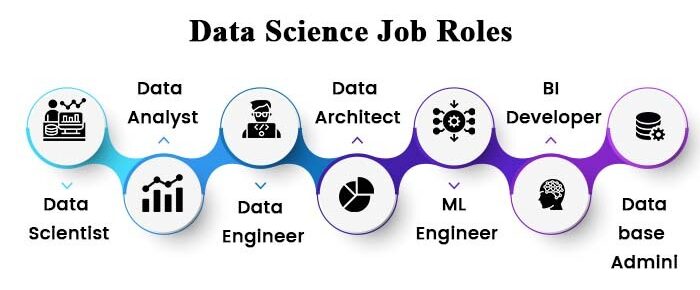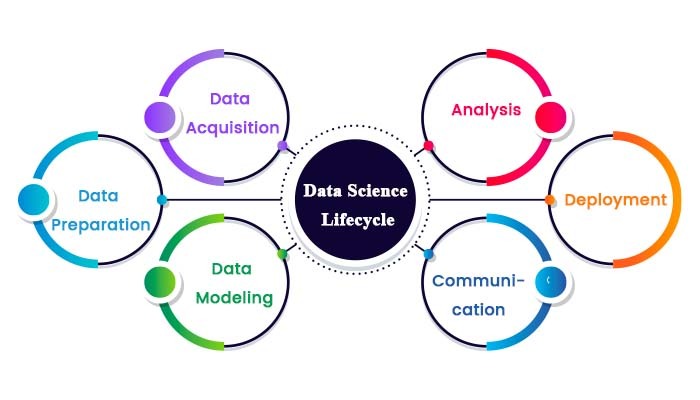To understand Data Science, it is really important to first understand the DATA that is being talked about here. Data is anything and everything that is recorded about everything in the world. To put it simply, anything in the world that is in recorded form is DATA.
It can be in the form of written data, images, audio, videos, or any multimedia form. This data can be in a structured, unstructured, or semistructured format. It has been projected that by 2021, the world will have generated a total of 79 zettabytes of data, and is expected to double by 2025!
This extensive guide to Data Science gives a clear answer to this confusion and explains Data Science, its importance to various organizations, its applications and uses, how Data Science works, the benefits and challenges involved, and, most importantly, the future scope and career prospects in the field of Data Science.
Among other things, we have also detailed the job profiles, the salary for different posts, and the courses required to pursue Data Science as a career, along with their fee structure.
What Is Data Science?
Data Science is the process that combines statistics, scientific methods, and algorithms to derive only meaningful and important insights from a ginormous pool of data. It is an interdisciplinary field whose true foundation lies in Statistics, Mathematics, Computer Science, and Business. Hence, it becomes a little difficult to understand what exactly Data Science is and what makes Data scientists one of the coolest professions today.
What to do with so much of this data? How to use it for the benefit of one and all? What are the real-world applications of the data? These are the questions that Data Science answers.
The field of Data Science has been growing at a very fast pace and has become a sort of revolution for many industries. Hence, it becomes a little difficult to encapsulate it in a single formal definition. It is a very broad discipline that continues to expand as big data grows exponentially with time.
However, in general, Data Science is the process of extracting and filtering clean and useful information from scattered and raw big data for the derivation of actionable insights.
Now you might still be thinking, How is any of this a big deal!? Why is Data Science such a hype? This is because you just know the meaning of Data Science and not its application in so many diverse sectors. After all, you are unaware of the dire importance of Data Science in current times. So let us first know WHY DATA SCIENCE?
Why Data Science? Importance of Data Science
The importance of Data Science has increased rapidly lately. The reason is the transformation of the data. Earlier, the data used to be in a structured format, which was small in size and hence could be handled using simple BI tools.
However, today most of the data is either unstructured or semi-structured, meaning the data is in the form of images, audio, videos, and other multimedia forms. So this data needs advanced analytical tools that are capable of handling huge volumes of such diverse data.
This is only one of the many reasons for the popularity of Data Science today. The other major reasons are the profitability and efficiency that it offers to businesses in various sectors. Not just businesses, but even common people benefit from Data Science as it makes their day-to-day life easy. How? Let’s check it out.
Data Science – Applications & Uses Across Sectors
Data Science has made life easy by reducing time and effort in doing tasks when compared to a few years ago. Let us go through some other uses and the importance of Data Science across sectors.
- Netflix and YouTube are able to recommend the content you want to see next. This is based on learned preferences using preferential analytics. This is not just restricted to recommendations for movies and songs. You can also get recommendations on restaurants, hospitals, malls, etc, in real-time based on your location or any other preference.
- Your telecom operator knows when you are more likely to switch to a competitor.
- Banks use Data science methods for fraud detection. There are other sectors in which Data Science helps in anomaly detection (crime, hacking, diseases, etc).
- Data Science technology, along with genomic data, offers a deeper understanding of genetic issues and even reactions to particular drugs and diseases.
- Classification of data based on several filters. (for example, classifying emails into “important”, “spam”, “promotion”, “junk”, etc.
- Logistics companies like Blue Dart, DHL, and FedEx have discovered the best time and routes to ship and the best time to deliver with the best mode of transport, leading to cost efficiency as well as customer satisfaction.
- Forecasting to help elevate sales and revenue, and also methods for customer retention.
- Recognition for security purposes (voice, facial, text, and more).
- Pattern Detection includes financial market patterns and even weather patterns. Airline companies can now easily predict flight delays and notify passengers beforehand to enhance their travel experience.
What Type of Data do Data Scientists Use?
This is a very common query about what type of data the Data Scientists use in the analysis. The answer is both structured and unstructured data.
Structured data comes in the form of Excel Spreadsheets and CSV files. To put it briefly, it is the kind of data that can be organised in rows and columns. Therefore, it is usually the written data that is either text or numbers. For example, Client data and spreadsheets with transaction information.
Unstructured data, on the other hand, is everything else. It includes images, audio and video files, other multimedia files, and any other type of data that exists. Unstructured data represents more than 80% of all enterprise data.
Is Data Science the Future?
By now, you know what Data Science is. Now, let us give you the reasons why you can consider pursuing Data Science as your career. Data Scientist continues to be among the most desired career paths since the early 21st century. Ironically, the term Data Science, which was first introduced in the 1980s, remains confusing even now.
Many people, especially outside the field, struggle to understand how Data Scientists help companies around the world and why their services are in such high demand. Anything that humans do is to fulfil their needs and requirements, and to do that, they need knowledge and information. This knowledge and information are stored in the form of data.
This data can be history, about plants, about species, about planets, about the earth, or simply about humans. Organisations can't perform tasks without some data of any form. So every business, organisation (public or private) across all sectors, be it education, health, science, finance, agriculture, tourism, or anything that you can think of, relies heavily on data of some sort.
And the recent revolution of digitalisation has made our world heavily dependent on big data. And this data seems to be growing more than ever. Hence, there is a need to manage this huge amount of data.
With an increasing amount of data, the need for Data Science professionals has also increased and is expected to grow even more in the future. According to surveys by Glassdoor and Forbes, the need for Data Science professionals might increase by a massive 28% by 2026. This means the profession is going to stay strong in the long run, making it a secure career.
Now, Data Science is a vast field, so there are many job opportunities within the field. Based on your interests and skills, you can choose one of them as your career. Given below are some of the most popular and in-demand job opportunities for Data Science professionals. Read: Top 10 Data Science Online Colleges in India!
Job Roles & Salary in Data Science 2025
Given below are the 7 Data Science job roles and the average salary they receive.

1. Data Scientist
This is the most general, most popular, and hence most in-demand job role. As a data scientist, you will have to oversee the entire process involved in a data science project. Starting from data collecting, processing, visualizing, testing, and finally deploying, while keeping in mind the business needs as well. The salary of a Data Scientist varies greatly based on the individual professional.
Average Base Salary- ₹8,64,729/-
Entry-level Salary- ₹5,76,440/- (less than 1 year of experience)
High-level Salary- ₹12,00,000/- (more than 20 years of experience)
2. Data Analyst
This is the second most pursued role in the Data Science industry. Apart from analyzing the data that has been collected, Data Analysts also visualize, transform, and manipulate the data. They might also be responsible for A/B testing analysis, as well as web analytics tracking, sometimes. The salary of a Data Analyst varies greatly based on the experience of the professional.
Average Base Salary- ₹4,63,202/-
Entry-level Salary- ₹3,61,718/- (less than 1 year of experience)
High-level Salary- ₹15,00,000/- (more than 20 years of experience)
3. Data Engineer
Data engineers are the ones who design, build, process, and maintain data pipelines. Their job is to make sure that the data is ready for the processing and analysis stage. The salary of a Data Engineer varies greatly based on the individual professional.
Average Base Salary- ₹8,65,518/-
Entry-level Salary- ₹4,67,737/- (less than 1 year of experience)
High-level Salary- ₹19,06,224/- (more than 20 years of experience)
4. Data Architect
A data architect shares some responsibilities with data engineers. They need to make sure that the data is accessible and in a format ready for data scientists and data analysts for modeling. The salary of a Data Architect varies greatly based on the experience of the professional.
Average Base Salary- ₹20,40,312/-
Entry-level Salary- ₹9,50,000/- (1-4 years of experience)
High-level Salary- ₹25,98,272/- (more than 20 years of experience)
5. Machine Learning Engineer
Machine Learning (ML) is an integral part of the Data Science online course. Hence, it becomes very important for companies to recruit Machine Learning Engineers who are highly qualified. ML Engineer is one of the most sought-after jobs in the world today, as it is not just restricted to Data Science. The salary of a Machine Learning Engineer varies greatly based on the experience of the professional.
Average Base Salary- ₹7,23,386/-
Entry-level Salary- ₹5,15,794/- (less than 1 year of experience)
High-level Salary- ₹20,15,877/- (more than 20 years of experience)
6. Business Intelligence Developer
Business Intelligence Developers are commonly referred to as BI Developers. They are the ones who need to link the business needs with the data collected. Their work is mostly business-oriented; however, they still must know the basics of data science and business intelligence. Most importantly, they must be comfortable with using new BI tools. The salary of a BI Developer varies greatly based on the professional.
Average Base Salary- ₹5,98,580/-
Entry-level Salary- ₹3,23,052/- (less than 1 year of experience)
High-level Salary- ₹13,40,801/- (more than 20 years of experience)
7. Database Administrator
Database administrators are in charge of managing the database system of the company. Sometimes companies hire data science teams to design their databases. In such cases, the Database Administrators are hired by the companies themselves to manage, monitor, and secure the company. The salary of a Database Administrator varies greatly based on the experience of the professional.
Average Base Salary- ₹5,09,032/-
Entry-level Salary- ₹2,91,290/- (less than 1 year of experience)
High-level Salary- ₹10,00,000/- (more than 20 years of experience)
Data Science Lifecycle
Broadly, the Data Science lifecycle can be classified into the following 6 different stages.

- Data Acquisition – It is very important to first understand the business problem and gather data accordingly.
- Data Preparation – Once the data is collected, it needs to be prepared for further use. This involves data cleaning, data transformation, data processing, data staging, and data architecture.
- Data Modeling – Here, the data is defined, refined, and classified. The data summarization is then followed by data modelling. This is the most important stage. Here, repetitive application of diverse ML techniques takes place to identify the model that best fits the business requirements.
- Visualization & Communication – Here, the business findings are communicated to the client. This is the stage for business intelligence and decision-making.
- Deploying the Model- This includes testing the selected model in a pre-production environment before deploying it in the production environment.
- Exploratory Data Analysis (EDA) – After a successful deployment of the data model, real-time exploratory/confirmatory analysis takes place. There is qualitative analysis, predictive analysis, text mining, and regression as well to monitor and maintain the performance of the project.
How Data Science differs from Data Analysis and Artificial Intelligence (AI)
Since Data Science is about extracting useful data from within big data, people usually question how iData Science is different from Statistics and Data Analysis?. Wel. Data Science is a broad subject that grows out of Statistics, including topics that are apt to deal with digital and big data.
Data Science is actually beyond Data Analysis. Data Analysis involves only extracting the data by analyzing and processing the data’s history. Data Analysis goes beyond extraction and analysis to use the data for insights that might be useful for businesses and organisations. Data Science uses advanced machine learning algorithms and other scientific and digital methods to make this data useful.
For instance, Data Science through Machine Learning and Artificial Intelligence (AI) can analyse customer behaviour of online shoppers and make relevant recommendations to them.
This way, the customers can easily find products that they may like and make their shopping experience seamless and efficient. This helps not just the customers but also the businesses, as they can please customers with their services. Also, they can run customized marketing campaigns for customer retention and minimize the shelf life of their product, thereby increasing their profits. And this is not just hearsay; there are facts supporting that Data Science has helped businesses grow exceptionally.
No wonder businesses are resorting to Data Scientists to help them with their marketing strategies and so much more, which we will be discussing shortly.
Another common misconception is that Data Science and Artificial Intelligence (AI) are interchangeable terms. However, that is not the case. They are two different terms and technologies that mostly work together to produce the required results. For example, Symbolic Reasoning is a type of AI that can not necessarily be characterised as Data Science.
Apart from Artificial Intelligence (AI), Machine Learning (ML) and Deep Learning are among other important domains within Data Science. Read: Data Science Salary In India!
Data Science Skills You Need to Know About!
Of course, the Data Science profession is multifaceted and requires technical knowledge of Data Science tools and platforms. Among other technical skills, data science professionals should be versed in programming languages like Python, R, and SQL.
Knowledge of BI tools is also sometimes required. However, these are the skills that can be learned through various online Data Science courses like MBA, MSc, BCA & more, but to upscale their career, data science professionals must possess very solid knowledge of-
- Statistics & Mathematics
- Computer Science skills
- Business understanding
- Analytical abilities
- Communication skills
Data Science Techniques
Some of the most frequently used data science techniques are:
- Statistical Inference
- Linear Algebra
- Logistic Regression
- Machine Learning techniques like Decision trees, support vector machines, clustering, and dimensionality reduction.
- Deep learning methods include supervised learning, unsupervised learning, and reinforcement learning.
Regardless of the method, the end goal of a data science professional is to make meaningful contributions to the business to create value for the company. If you wish to pursue Data Science as your career and want to know how you can become a Data Scientist, you can go to College Vidya and check out the various online data science courses provided by UGC-approved online universities in India.







![What Is the Scope of Data Science In India? [Latest 2026]](https://d1aeya7jd2fyco.cloudfront.net/blog/what-is-the-scope-of-data-science-in-india.webp)
![How To Become A Data Scientist [A Complete Guide 2026]](https://d1aeya7jd2fyco.cloudfront.net/blog/how-to-become-a-data-scientist-comprehensive-guide.webp)








